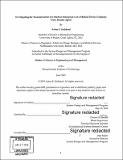Investigating the transformation of a medical enterprise : can a medical device company truly become agile?
Author(s)
Hubbard, Arlesa E.(Arlesa Elizabeth)
Download1119537349-MIT.pdf (15.90Mb)
Other Contributors
Massachusetts Institute of Technology. Engineering and Management Program.
System Design and Management Program.
Advisor
Donna H. Rhodes.
Terms of use
Metadata
Show full item recordAbstract
With the competitive landscape of technology increasing at a rapid pace, medical device manufacturers are struggling to keep up with the demands of the market and provide hardware and software solutions to support connected health technologies. Over the last decade, in an attempt to match the pace of the market, an increasing number of enterprises have shifted their product development processes from traditional stage-gated models to iterative development models, including Agile. Using the architecting innovative enterprise strategy (ARIES) framework, literature reviews, and gathered knowledge from subject matter experts and stakeholders relevant to the enterprise, this thesis explores the benefits, challenges, and impact of transforming a medical device enterprise's product development process from waterfall to Agile methodologies. The interfaces of the enterprise within both its internal and external ecosystems were assessed in this research; due to the complexity of the medical device industry, stakeholder analysis was used as a tool to identify and prioritize the key interfaces which are critical for a successful enterprise transformation. Approaching the challenge of imposing organizational change in a systems manner ensures that the enterprise and the environment within which it operates are viewed in a holistic sense and that the proposed solution(s) satisfy key beneficiaries and stakeholders. The research demonstrates that the voice of the project team, cross-functional team alignment, and support and empowerment of senior management are crucial to the success of this transformation and ultimately will impact the ability of the enterprise to meet their objectives and sustain their envisioned future.
Description
Thesis: S.M. in Engineering and Management, Massachusetts Institute of Technology, System Design and Management Program, 2019 Cataloged from PDF version of thesis. Vita. Includes bibliographical references (pages 85-87).
Date issued
2019Department
Massachusetts Institute of Technology. Engineering and Management ProgramPublisher
Massachusetts Institute of Technology
Keywords
Engineering and Management Program., System Design and Management Program.